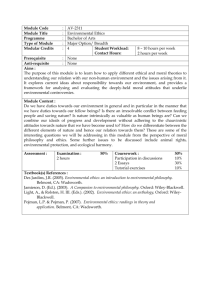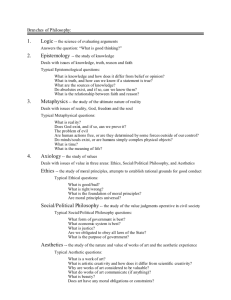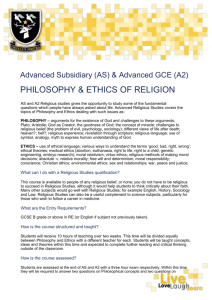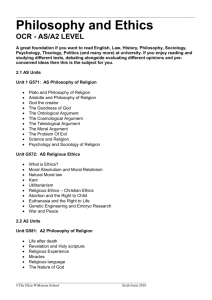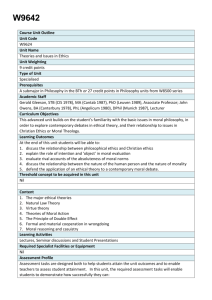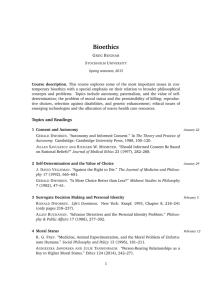Twenty-five Years of Business Ethics— How the Field is Still
advertisement
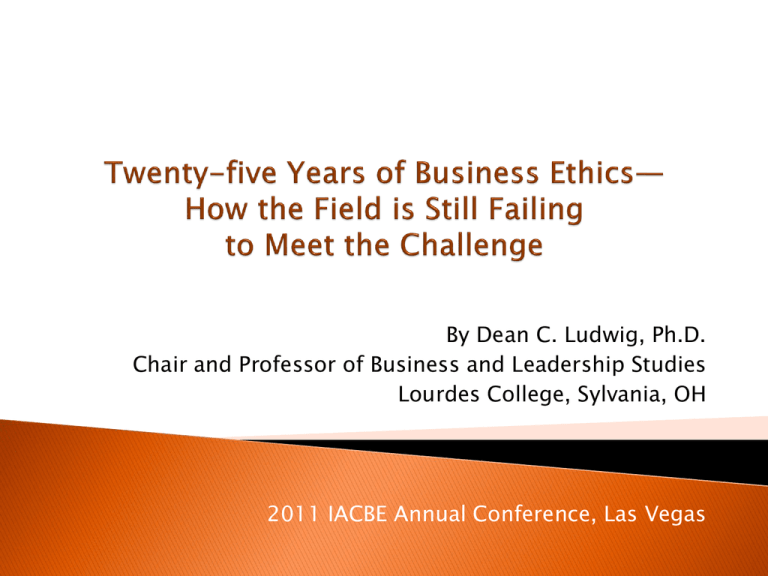
By Dean C. Ludwig, Ph.D. Chair and Professor of Business and Leadership Studies Lourdes College, Sylvania, OH 2011 IACBE Annual Conference, Las Vegas “As we approach a quarter century of including ethics education in the business curriculum, it is worth pausing to reflect on the origin and purpose of this endeavor and to evaluate whether or not the effort has been successful in achieving its intended outcomes.” Prior to 1960 ◦ A Century Long Decline in Moral Instruction After 1960 ◦ An emerging interest in applied/professional ethics ◦ Fueled by ethical problems emerging in the professions Medical technology, e.g., test-tube babies Political scandals Business fraud Engineering catastrophes Boundaries in Journalism 1970’s The start of some reflection/action in the professional schools. Early work largely conducted by members of philosophy departments, trained in moral philosophy, who developed ties to counterparts in the professional schools. In business, this is fueled by concern over high profile cases of business fraud. Little to no formal integration into the business curriculum. 1980—Formation of the Society for Business Ethics Most members were trained in philosophy. These individuals set much of the tone of the early work, developing courses, modules, materials, and most of the texts. Heavy emphasis on critical thinking about complex moral problems. Business faculty begin to seriously discuss the integration of ethics into the business curriculum. Experimentation with modules and courses Virtually no required courses at any business school until late in the decade Turning Point—John Shad’s $30 million gift to Harvard in 1987 to promote ethics education in the Harvard Business School 1990-International Association for Business and Society established. ◦ Many members trained in business with acquired knowledge of moral philosophy—heavier emphasis on issues of corporate social responsibility. Proliferation of required courses/modules in ethics in schools of business. ◦ Depends on schools ability to find a faculty with training in both business and moral philosophy Gradual inclusion in accreditation standards The field has been focused on applied ethics—the careful thinking about complex moral issues/ethical dilemmas. The implied learning outcome is the “ability to reason about complex ethical issues that they may face in their own professional lives” Little emphasis on “right answers” This approach leaves students with the impression that moral problems do not normally have convincing solutions ◦ Prompts confusion ◦ Reinforces ethical relativism ◦ Most importantly, fails to improve standards of behavior—this is the learning outcome that gave voice to the field. Knowledge Skills Desire The M.B.A. Oath Leadership and Corporate Accountability (LCA) at Harvard Business School As a business leader I recognize my role in society. ◦ My purpose is to lead people and manage resources to create value that no single individual can create alone. ◦ My decisions affect the well-being of individuals inside and outside my enterprise, today and tomorrow. ◦ Therefore, I promise that: ◦ I will manage my enterprise with loyalty and care, and will not advance my personal interests at the expense of my enterprise or society. ◦ I will understand and uphold, in letter and spirit, the laws and contracts governing my conduct and that of my enterprise. ◦ I will refrain from corruption, unfair competition, or business practices harmful to society. ◦ I will protect the human rights and dignity of all people affected by my enterprise, and I will oppose discrimination and exploitation. ◦ I will protect the right of future generations to advance their standard of living and enjoy a healthy planet. ◦ I will report the performance and risks of my enterprise accurately and honestly. ◦ I will invest in developing myself and others, helping the management profession continue to advance and create sustainable and inclusive prosperity. In exercising my professional duties according to these principles, I recognize that my behavior must set an example of integrity, eliciting trust and esteem from those I serve. I will remain accountable to my peers and to society for my actions and for upholding these standards. This oath I make freely , and upon my honor. Is ethics education in business beginning to move in a new direction? Could IACBE play a leadership role in fostering ethics education in business that is more effectively influences executive/managerial behavior of our graduates?
